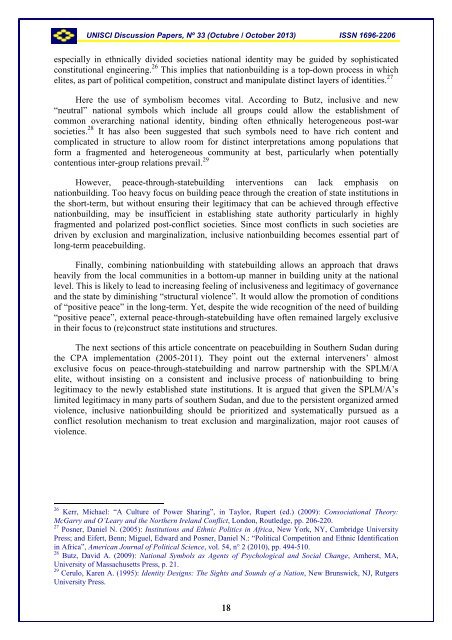UNISCI - Universidad Complutense de Madrid
UNISCI - Universidad Complutense de Madrid
UNISCI - Universidad Complutense de Madrid
Create successful ePaper yourself
Turn your PDF publications into a flip-book with our unique Google optimized e-Paper software.
<strong>UNISCI</strong> Discussion Papers, Nº 33 (Octubre / October 2013) ISSN 1696-2206especially in ethnically divi<strong>de</strong>d societies national i<strong>de</strong>ntity may be gui<strong>de</strong>d by sophisticatedconstitutional engineering. 26 This implies that nationbuilding is a top-down process in whichelites, as part of political competition, construct and manipulate distinct layers of i<strong>de</strong>ntities. 27Here the use of symbolism becomes vital. According to Butz, inclusive and new“neutral” national symbols which inclu<strong>de</strong> all groups could allow the establishment ofcommon overarching national i<strong>de</strong>ntity, binding often ethnically heterogeneous post-warsocieties. 28 It has also been suggested that such symbols need to have rich content andcomplicated in structure to allow room for distinct interpretations among populations thatform a fragmented and heterogeneous community at best, particularly when potentiallycontentious inter-group relations prevail. 29However, peace-through-statebuilding interventions can lack emphasis onnationbuilding. Too heavy focus on building peace through the creation of state institutions inthe short-term, but without ensuring their legitimacy that can be achieved through effectivenationbuilding, may be insufficient in establishing state authority particularly in highlyfragmented and polarized post-conflict societies. Since most conflicts in such societies aredriven by exclusion and marginalization, inclusive nationbuilding becomes essential part oflong-term peacebuilding.Finally, combining nationbuilding with statebuilding allows an approach that drawsheavily from the local communities in a bottom-up manner in building unity at the nationallevel. This is likely to lead to increasing feeling of inclusiveness and legitimacy of governanceand the state by diminishing “structural violence”. It would allow the promotion of conditionsof “positive peace” in the long-term. Yet, <strong>de</strong>spite the wi<strong>de</strong> recognition of the need of building“positive peace”, external peace-through-statebuilding have often remained largely exclusivein their focus to (re)construct state institutions and structures.The next sections of this article concentrate on peacebuilding in Southern Sudan duringthe CPA implementation (2005-2011). They point out the external interveners’ almostexclusive focus on peace-through-statebuilding and narrow partnership with the SPLM/Aelite, without insisting on a consistent and inclusive process of nationbuilding to bringlegitimacy to the newly established state institutions. It is argued that given the SPLM/A’slimited legitimacy in many parts of southern Sudan, and due to the persistent organized armedviolence, inclusive nationbuilding should be prioritized and systematically pursued as aconflict resolution mechanism to treat exclusion and marginalization, major root causes ofviolence.26 Kerr, Michael: “A Culture of Power Sharing”, in Taylor, Rupert (ed.) (2009): Consociational Theory:McGarry and O’Leary and the Northern Ireland Conflict, London, Routledge, pp. 206-220.27 Posner, Daniel N. (2005): Institutions and Ethnic Politics in Africa, New York, NY, Cambridge UniversityPress; and Eifert, Benn; Miguel, Edward and Posner, Daniel N.: “Political Competition and Ethnic I<strong>de</strong>ntificationin Africa”, American Journal of Political Science, vol. 54, n° 2 (2010), pp. 494-510.28 Butz, David A. (2009): National Symbols as Agents of Psychological and Social Change, Amherst, MA,University of Massachusetts Press, p. 21.29 Cerulo, Karen A. (1995): I<strong>de</strong>ntity Designs: The Sights and Sounds of a Nation, New Brunswick, NJ, RutgersUniversity Press.18
















